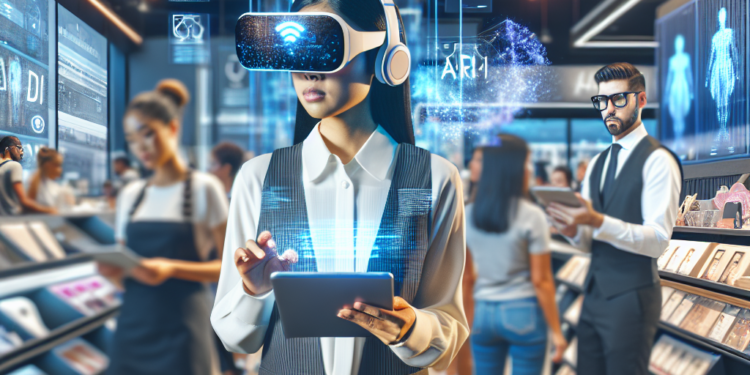AI and Augmented Reality in Retail: Revolutionizing the Shopping Experience
The retail industry has undergone a dramatic transformation in recent years, with the rise of e-commerce and mobile shopping changing the way consumers interact with brands and make purchases. In an effort to stay ahead of the curve, many retailers have turned to cutting-edge technologies like artificial intelligence (AI) and augmented reality (AR) to enhance the shopping experience and increase customer engagement.
AI, in particular, has played a key role in revolutionizing the way retailers interact with customers. By analyzing vast amounts of data on customer behavior and preferences, AI-powered tools can help retailers personalize the shopping experience, recommend products, and provide targeted marketing messages. For example, AI-powered chatbots can provide instant customer service, while AI algorithms can analyze customer data to predict future buying patterns and tailor promotions accordingly.
One of the most exciting applications of AI in retail is the use of computer vision technology to create cashier-less stores. With this technology, customers can enter a store, pick up items, and simply walk out without the need to stop at a traditional checkout counter. Retailers like Amazon have already implemented this technology in their Amazon Go stores, providing a seamless and convenient shopping experience for customers.
Augmented reality, on the other hand, has opened up a whole new world of possibilities for retailers looking to enhance the shopping experience. By overlaying digital information onto the physical world, AR technology allows customers to try on clothes, see how furniture looks in their home, and visualize products in a way that was previously impossible. For example, beauty retailers like Sephora have introduced AR-powered makeup try-on tools that allow customers to see how different products will look on their face before making a purchase.
One of the key benefits of AR in retail is the ability to bridge the gap between the online and offline shopping experiences. By using AR technology in stores, retailers can provide a more immersive and interactive shopping experience that combines the convenience of online shopping with the tactile experience of shopping in a physical store. This can help drive foot traffic to brick-and-mortar locations and increase engagement with customers who are increasingly turning to online shopping.
Another key application of AR in retail is the use of virtual reality (VR) technology to create virtual stores and showrooms. By putting on a VR headset, customers can explore a virtual store, browse products, and make purchases without leaving their home. This technology has been particularly useful during the COVID-19 pandemic, allowing retailers to continue serving customers even when physical stores are closed.
Overall, the combination of AI and AR technology has the potential to revolutionize the retail industry and provide customers with a more personalized, engaging, and convenient shopping experience. By harnessing the power of AI to analyze customer data and provide personalized recommendations, retailers can increase customer loyalty and drive sales. Similarly, by using AR technology to create immersive and interactive shopping experiences, retailers can differentiate themselves from competitors and provide a unique value proposition to customers.
As these technologies continue to evolve and become more mainstream, it is clear that retail will never be the same. Retailers who embrace AI and AR technology and incorporate it into their business strategy will be well-positioned to succeed in the digital age and provide customers with the innovative shopping experiences they crave.
In conclusion, AI and AR technology have the power to transform the retail industry and provide customers with a more personalized and engaging shopping experience. By harnessing the power of AI to analyze customer data and provide personalized recommendations, retailers can increase customer loyalty and drive sales. Similarly, by using AR technology to create immersive and interactive shopping experiences, retailers can differentiate themselves from competitors and provide a unique value proposition to customers. The future of retail is here, and it is powered by AI and AR technology.













